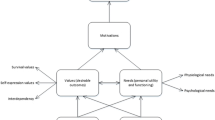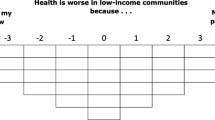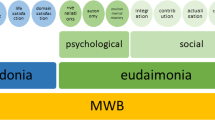Abstract
This paper uses the Quality of Life research carried out by the Wellbeing in Developing Countries (WeD) Research Group to examine the importance respondents have attributed to a variety of goals in two rural communities in Ethiopia. The results are analysed at the community, household and individual levels to expose the contestation involved in expressions of goal preference at different levels, and the power relations that underlie and contribute to the formation of these goal preferences. In this way, taking communities or households as homogenous units is shown to be inaccurate and potentially misleading. Analysis of individual case studies also provides insight into the complex decision-making process where people with access to limited resources are forced to give certain goals priority depending on current exigencies. The fact that the ordering of priorities can change with time highlights the dangers of any one-off measure being considered as a time-independent picture of individuals’ goals. By relating the results of the research to Doyal and Gough’s Theory of Human Need, the paper considers to what extent ‘universal’ human needs correspond to the most important goals as expressed by respondents in the Ethiopian research. Whilst considerable support is found for needs such as health, food and shelter, several respondents in the two research sites consider needs such as education to be unnecessary. This incongruence between the priority of people’s goals and theories of need leads us to question what the aim of development should be: to assist beneficiaries in the pursuit of what they want, or provide the things that they are thought to need.
Similar content being viewed by others
Notes
The conceptual and methodological findings of this research appear in Gough & McGregor (2007).
This was administered alongside other tools which are described in the WeD Quality of Life toolbox: http://www.welldev.org.uk/research/methods-toobox/qol-toolbox.htm
Bangladesh, Peru and Thailand in addition to Ethiopia.
in-Depth Exploration of Ethiopian Poverty.
Respondents were asked: ‘What things do you need to be happy?’ and their responses were scored on the following scale: 0: Not necessary, 1: Necessary, 2: Very necessary’
Gough defines harm as ‘fundamental disablement in the pursuit of one’s vision of the good’ or ‘an impediment to successful social participation’ (2003: 8, emphasis in original).
For example Alkire (2002) compares several lists of universal needs and goals.
Whilst these approaches to studying wellbeing undoubtedly overlap, they also differ. As such, happiness is a suitable focus of investigation from a hedonic perspective, however, from a eudaimonic point of view, to consider what a person needs to be happy, will reveal an incomplete set of goals required to achieve wellbeing.
The research officers working in Kedada, did not suggest knowledge as an important goal in the site and, as such, it was not included in the Kedada questionnaire (Bethlehem 2005).
In Kedada 53 of the respondents stated that they were Muslim and eight did not state any religion or did not answer.
In Dessu there were 28 Orthodox Christian respondents and 29 Muslim ones. Five respondents did not state any religion or did not answer.
The only exception to this is for the goal of a bridge (1.9 in Kedada with a standard deviation of 0.3 compared with 0.9 in Dessu with a standard deviation of 0.6). However, this level of consensus is hardly surprising given the overwhelming need for a bridge in Kedada, as previously discussed.
As previously discussed, infertility is considered to be an exclusively female problem.
I am grateful to Pip Bevan regarding this point.
See for example, NEF (2003), which demonstrates that people pursue the goal of increasing their income, to the detriment of other goals, despite the fact that this has been shown not to increase happiness or life satisfaction.
References
Alkire, S. (2002). Dimensions of human development. World Development, 30(2), 181–205.
Bachrach, P., & Baratz, M. S. (1970). Power and poverty: Theory and practice. Oxford: Oxford University Press.
Bethlehem, T. (2005). Developing Ethiopia WeD-QoL: ‘Working through the process’. Addis Ababa: WeD-Ethiopia (Unpublished).
Bevan, P., Pankhurst, A., & Lavers, T. (Eds.) (2006). Ethiopian village studies II. Addis Ababa: WeD-Ethiopia. Available online at: www.wed-ethiopia.org/comprof.htm.
Brown, K. W., & Ryan, R. M. (2003). The benefits of being present: Mindfulness and its role in psychological wellbeing. Journal of Personality and Social Psychology, 84, 822–848.
Camfield, L., McGregor, J. A., & Yamamoto, J. (2005). Quality of life and its relationship to wellbeing. Bath: Wed Research Group, University of Bath (Unpublished).
Clark, D. A. (2002). Visions of development: A study of human value. Cheltenham: Edward Elgar.
Cockburn, J. (2001). Child labour versus education: Poverty constraint or income opportunity? Oxford: Centre for the Study of African Economies, Oxford University.
Doyal, L., & Gough, I. (1991). A theory of human need. Basingstoke: MacMillan.
Ellis, F., & Tassew, W. (2005). Ethiopia participatory poverty assessment 2004–05. Addis Ababa: Ministry of Finance and Economic Development (MoFED).
Escobar, A. (1995). Encountering development: The making and unmaking of the third world. Princeton: Princeton University Press.
Gebre-Egzbiabher K., & White, M. (2004). Migration, community context, and child immunization in Ethiopia. Social Science and Medicine, 59, 2603–2616.
Gough , I. R. (2004). Human wellbeing and social structures: Relating the universal and the local. Global Social Policy, 4(3), 289–311.
Gough, I. R. (2003). Lists and thresholds: Comparing the Doyal-Gough theory of human need with Nussbaum’s capabilities approach. WeD Working Paper 1. (Bath: WeD Research Group, University of Bath).
Gough I. R., McGregor J. A. (Eds.) (2007) Wellbeing in developing countries: From theory to research. Cambridge: Cambridge University Press.
Hayek, F. (1949). Individualism and economic order. London: Routledge and Kegan Paul.
Lukes, S. (2005). Power: A radical view (2 ed.). Basingstoke: Palgrave MacMillan.
McGregor, J. A. (2004). Researching wellbeing. Global Social Policy, 4(3), 337–358.
McGregor, J. A., & Camfield, L. (2005). Terms of reference for phase 3 of the QoL research (applied and methodological). Bath: Wed Research Group, University of Bath (Unpublished).
Mill, J. S. (1859) [1974]. On liberty. Harmondsworth: Penguin Books.
Myrdal, G. (1962). Value in social theory. London: Routledge and Kegan Paul.
Narayan, D., Patel, R., Schafft, K., Rademacher, A., & Koch-Schulte, S. (2000). Voices of the poor: Can anyone hear us? Oxford: Oxford University Press for the World Bank.
New Economics Foundation (2003). The politics of happiness. London: NEF.
Nussbaum, M. (2003). Capabilities as fundamental entitlements: Sen and social Justice. Feminist Economics, 9(2–3), 33–59.
Nussbaum, M. (2000). Women and human development: The capabilities approach. Cambridge and New York: Cambridge University Press.
Ryan, R., & Deci, E. (2001). On happiness and human potentials: A review of research on hedonic and eudaimonic wellbeing. Annual Review of Psychology, 52, 141–66.
Ryan, R., & Sapp, A. (2007). Basic psychological needs: A self-determination theory perspective on the promotion of wellness across development and cultures. In I. R. Gough, & J. A. McGregor (Eds.) Wellbeing in developing countries: From theory to research. Cambridge: Cambridge University Press.
Sen, A. (2002). Rationality and freedom. Cambridge, Massachusetts and London, England: The Belknap Press of Harvard University.
Sen, A. (1999). Development as freedom. Oxford: Oxford University Press.
Tassew, W., Alemu, M., Jones, N., Bekele, T., Seager, J., Tekie, A., & Getachew A. (2005). Education choices in Ethiopia: what determines whether poor households send their children to school? Young lives working paper 15. London: Save the Children UK.
Tietjen, K. (1998). The demand for primary education in rural Ethiopia. Technical paper 87. (USAID).
Wolde, G. (2002). Democratisation process and gender. In B. Zewde, & S. Pausewang (Eds.), Ethiopia: The challenge of democracy from below. Uppsala/Addis Ababa: Nordiska Afrikainstutet/Forum for Social Studies.
Acknowledgements
The support of the UK Economic and Social Research Council (ESRC) is gratefully acknowledged. The work was part of the programme of the ESRC Research Group on Wellbeing in Developing Countries.
An earlier version of this paper was presented to the Fourth International Conference on the Ethiopian Economy in Addis Ababa. Comments received at the conference were useful in making revisions, and I would like to thank Pip Bevan, Laura Camfield, Ian Gough, J. Allister McGregor, Alula Pankhurst, Alison Woodcock and two anonymous reviewers for their comments on earlier drafts of this paper.
Author information
Authors and Affiliations
Corresponding author
Rights and permissions
About this article
Cite this article
Lavers, T. Reconciling the needs and wants of respondents in two rural Ethiopian communities. Soc Indic Res 86, 129–147 (2008). https://doi.org/10.1007/s11205-007-9110-x
Received:
Accepted:
Published:
Issue Date:
DOI: https://doi.org/10.1007/s11205-007-9110-x




